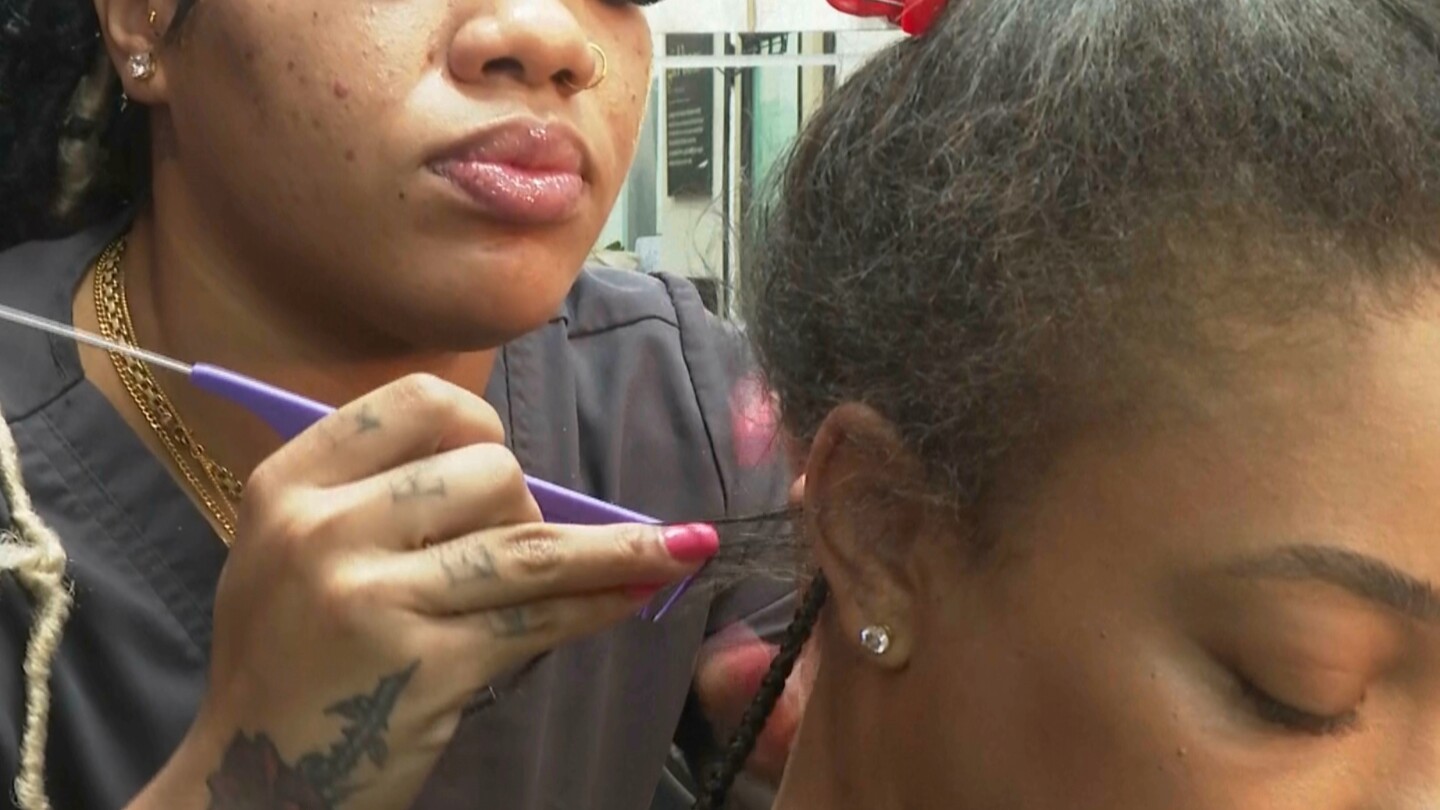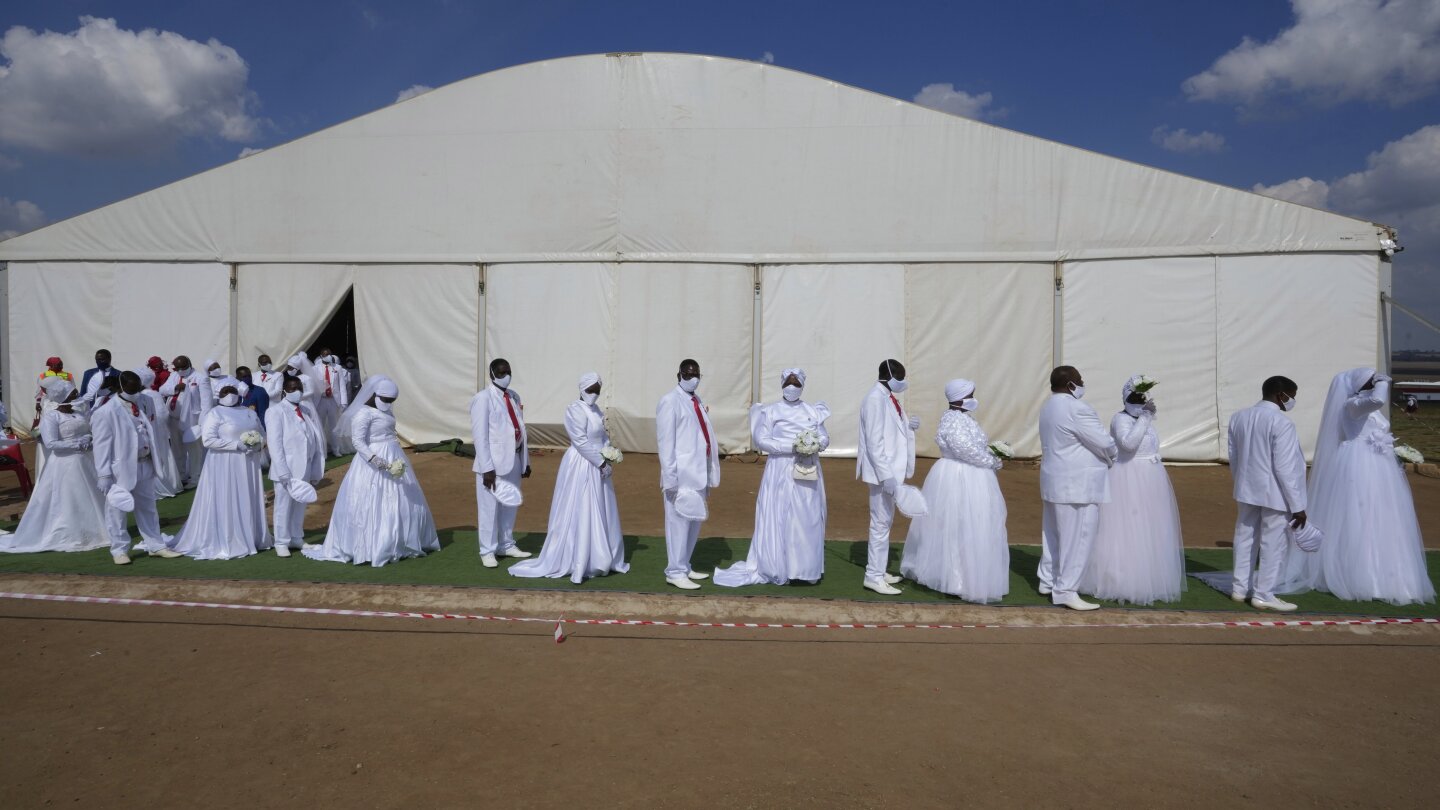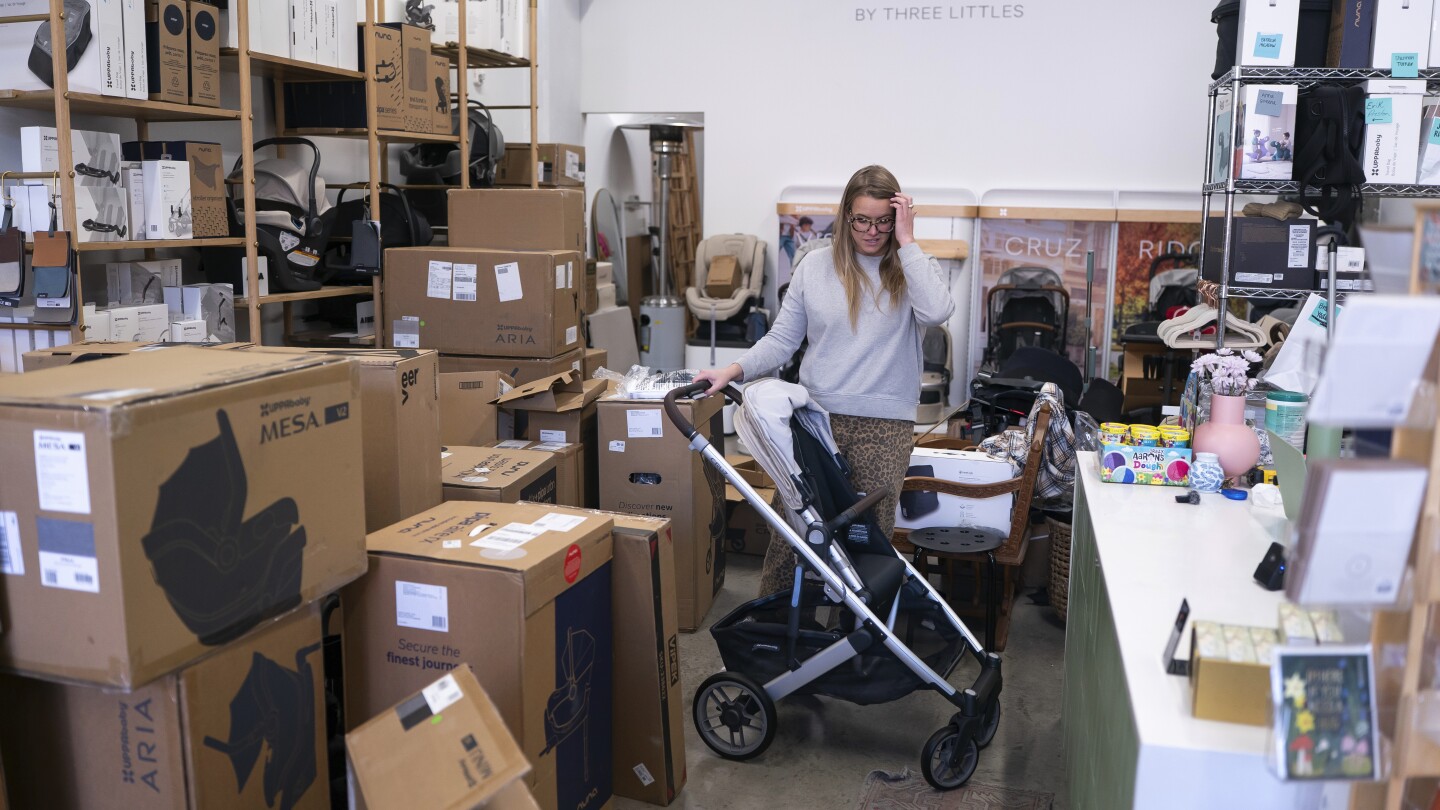Lifestyle
Black women’s hair products are in the safety spotlight. Here’s what to know

ATLANTA (AP) — Black women around the world gather in salons, dorm rooms and living rooms for hours at a time to get synthetic braids put in their hair. But they’re wondering if the convenience and fashion benefits are being outweighed by potential health hazards.
The question circulating on social media and in the Black community follows on the heels of a proposed federal rule — that’s still in limbo after multiple delays — to ban the carcinogen formaldehyde in hair-straightening chemicals.
There’s a thin body of research into the potential issues of using synthetic hair for braids. The latest addition is an independent study from Consumer Reports into chemicals found in braiding products. Some say the findings are concerning, but others are hesitant to make recommendations in part because the methodology did not go through a typical study review process.
All of the experts who spoke with The Associated Press did agree more research is needed into synthetic braids and other products Black women often use in or on their hair. Here’s a look at what’s known, what’s not known and what you might want to do in the meantime.
What’s known about synthetic braids?
Experts say it’s difficult to draw conclusions from prior studies. The Consumer Reports study, which was published in late February, said there were dangerous chemicals like lead, benzene and other carcinogens in 10 of the most popular synthetic braiding products.
While experts said the presence of the chemicals is concerning and confusing, they noted the study didn’t go through the rigorous scrutiny that it takes to get published in a peer-reviewed science or medical journal.
Javon Ford, a cosmetic chemist who talks about his work on social media, questioned the report’s findings, saying “the data set is so limited.” Consumer Reports only sampled two of each product, despite thousands on the market.
James Rogers, the head of product safety at Consumer Reports who led the study, said his hope was to get the information out there because of the lack of research. He noted that it was a pilot project, but that “we thought the results were important enough to start the conversation.”
Research published in 2020 in the journal Environmental Health Insights showed synthetic hair let off volatile organic compounds — chemicals that can easily evaporate into the air — when heated. Synthetic hair is sealed when braided, either by burning it or dipping it in hot water. That study detected many of the same chemicals named in the Consumer Reports study, like the known carcinogen benzene.
What isn’t known about synthetic braids?
Experts can’t answer whether the products are truly safe — but that’s because there’s so little research out there.
There’s also little government oversight on the products, which leaves manufacturers to ensure that they’re safe. Consumer Reports is petitioning the Food and Drug Administration to begin regulating synthetic braiding hair.
Jasmine McDonald, a professor of epidemiology at Columbia University who has studied the health impacts of chemical hair straighteners, said the Consumer Reports study shouldn’t invoke fear but awareness about the potential harms of braiding hair, the lack of federal regulations and the minimal research.
“I think that in our culture, we sometimes normalize things to the point where we don’t see the harm … the more that we can raise awareness that some of these cultural routines could potentially provide harm is us having the potential to stop that harm,” McDonald said.
What should I use on my hair?
If you’re concerned about using synthetic braiding hair or straightening chemicals, there are other hairstyles to try.
You can use Brazilian wool hair instead of synthetic hair, said Gloria Okpurukre, who owns Anointed Fingers braiding salon in Fayetteville, Georgia. You can also braid your real hair, but don’t expect the same results.
“The purpose of adding the hair is for volume and length,” Okpurukre said. “A lot of people, their hair starts thinning out and they need to add something to make it look nice.”
Some synthetic brands use banana fiber to create the hair, which companies say are less irritating to the scalp. But Ford said you won’t necessarily avoid chemicals just because you switch brands.
Raven Baxter, a molecular biologist who has talked about braiding hair on social media, opted to stop using synthetic braiding products because of the lack of information — both on the packaging or in research studies. Now, she uses single-ingredient products in her hair care routine, like aloe vera gel and vegetable glycerin.
“A lot of the work that scientists do, we’re able to do it because a funder deemed it as important to support that research,” she said, adding, “until we have funders that value the things that we’re concerned about, we’re not necessarily going to get the research published that concerns us.”
McDonald suggested staying away from products that contain PFAS, parabens and other “forever chemicals.”
She also said consumers can determine what’s in the products and their relative safety by looking at online databases, like the Breast Cancer Prevention Partners’ Campaign for Safe Cosmetics.
___
The Associated Press Health and Science Department receives support from the Howard Hughes Medical Institute’s Science and Educational Media Group and the Robert Wood Johnson Foundation. The AP is solely responsible for all content.
Lifestyle
A Pentecostal church in South Africa holds mass Easter weddings for 3,000 people, some polygamous

JOHANNESBURG (AP) — A Pentecostal church in South Africa celebrated Easter Sunday with mass wedding ceremonies for around 3,000 people, with many of them entering into polygamous marriages.
The International Pentecost Holiness Church said mass weddings are part of its Easter festivities and the tradition of polygamy, which is observed in some African cultures, has been incorporated into the church.
Sunday’s ceremonies would see some men marry their sixth or seventh wives, church spokesperson Vusi Ndala said. Other grooms were set to marry multiple brides at one time, Ndala said.
“Polygamy is not only embraced but held in high regard” in the church, Ndala said.
A man with his wife and two of his brides walk, during mass Easter weddings for 3,000 people, some polygamous, at the International Pentecost Holiness Church in Heidelberg, east of Johannesburg, South Africa, Sunday, April 20, 2025. (AP Photo/Themba Hadebe)
Couples dance as they enter the church building during mass Easter weddings for 3,000 people, some polygamous, at the International Pentecost Holiness Church, in Heidelberg, east of Johannesburg, South Africa, Sunday, April 20, 2025. (AP Photo/Themba Hadebe)
People queue during mass Easter weddings for 3,000 people, some polygamous, at the International Pentecost Holiness Church in Heidelberg, east of Johannesburg, South Africa, Sunday, April 20, 2025. (AP Photo/Themba Hadebe)
The International Pentecost Holiness Church was founded in South Africa in the early 1960s. It is an African-initiated church, meaning it was founded by Africans rather than foreign missionaries, and blends Pentecostal beliefs with local traditions.
The church has held mass weddings before, including in 2023 when around 400 couples or bridal parties tied the knot. It says this year’s event was its largest by far.
Ndala said the large number of people being married this year was because of “a large number of men marrying more than one wife at a go.”
In some cases, grooms brought their current wife or wives to be with them for their new marriage.
The weddings were held at the church’s headquarters, a huge, dome-shaped building in the town of Heidelberg, near Johannesburg, that can seat 60,000 people.
The congregants who were being married waited in long white tents set up in open fields next to the church building, where they were given bridal flowers, food packs and water. They then filed into the church building in long queues, the women wearing white bridal gowns and many of the men in matching white suits and red ties.
Polygamy is legal in South Africa if the union is registered as a customary marriage.
A man with his wife and two of his brides sits inside a marquee ahead of the mass Easter weddings for 3,000 people, some polygamous, at the International Pentecost Holiness Church in Heidelberg, east of Johannesburg, South Africa, Sunday, April 20, 2025. (AP Photo/Themba Hadebe)
A groom in a wheelchair is assisted by a fellow member whilst his two brides walk in front, during mass Easter weddings for 3,000 people, some polygamous, at The International Pentecost Holiness Church in Heidelberg, east of Johannesburg, South Africa, Sunday, April 20, 2025. (AP Photo/Themba Hadebe)
___
AP Africa news: https://apnews.com/hub/africa
Lifestyle
Queen Elizabeth II’s favorite dog breed race for glory in the UK’s Corgi Derby

LONDON (AP) — Some of the fastest canines on four very short legs have raced for glory in Scotland’s annual Corgi Derby.
The Musselburgh Racecourse Corgi Derby was first held in 2022 to mark Queen Elizabeth II’s 70 years on the throne. The late monarch was a devoted corgi fan who owned almost 30 of the breed over the decades, along with a few dorgis – a corgi-dachshund cross.
Four-year-old Juno beat a 16-strong field of dashing dogs dressed in bright sweaters over the 230-foot (70-meter) race on Saturday at the racecourse outside Edinburgh. She came from behind in the final stretch to beat last year’s winner, Rodney.
The winner and her owners, Alisdair Tew and Fran Brandon, were presented with a trophy and dog treats by tennis coach Judy Murray, mother of Scottish star Andy Murray.
Tew told the BBC that “we trained her for this last year but this year we just resorted to just letting her chasing things, particularly seagulls” on Edinburgh’s Portobello Beach.
“Juno is always ready for treats -– that is probably why she won,” he said.
Elizabeth’s love of corgis began in 1933 when her father, King George VI, brought home a Pembroke Welsh corgi they named Dookie
Corgis were often by Elizabeth’s side in the decades before her death in September 2022 — accompanying her on official tours, reportedly sleeping in their own room at Buckingham Palace and occasionally nipping the ankles of visitors or royal family members.
Three corgis even appeared alongside the queen as she climbed into James Bond’s waiting helicopter in the spoof video that opened the 2012 London Olympics.
Lifestyle
Tariffs are likely to make having a baby cost more

Sam Rutledge and his wife have a baby due in mid-July, so they thought they had a few more months to research and buy the gear they’ll need.
But President Donald Trump’s tariff announcement in early April turned the couple’s slow walk into a sprint. In the past few weeks, they’ve bought two strollers, a car seat, a nursery glider, a crib and a high chair. All of them are made overseas.
“These are all pretty expensive under normal conditions, but when it became clear tariffs were coming we decided to buy them in case they became prohibitively expensive,” said Rutledge, who is a high school physics teacher.
Raising a child in America has never been cheap. In the first year alone, it costs an average of $20,384, according to Baby Center, a parenting website. But tariffs – ranging from 10% for imports from most countries to 145% for imports from China — will make it many times more expensive for new parents.
An estimated 90% of the core baby care products and the parts that go into making baby paraphernalia – from bottles and diaper pails to strollers and car seats – are made in Asia, according to the Juvenile Products Manufacturers Association, a U.S. trade group. The vast majority come from China.
“Overseas manufacturing has been the norm in our industry for decades,” said Lisa Trofe, the association’s executive director.
It wasn’t always this way. When Munchkin Inc. CEO Steven Dunn founded his company in 1991, it made baby bottles in California with tooling from New Jersey. But over the years, the manufacturers he used shut down and the cost of doing business in the U.S. skyrocketed. Now, about 60% of Munchkin’s 500 products, from a $5 sippy cup to a $254 Night Owl Stroller with headlights, are made in China.
In response to the tariffs, Dunn halted orders from China and instituted a hiring freeze at Munchkin’s California headquarters, where 320 people are employed. Dunn expects Munchkin will run out of some products within three months.
“There is no possibility of being able to pass on those tariffs” to customers in the form of price increases, he said.
Dunn said he tried to reduce his dependence on China in recent years, shifting some manufacturing to Vietnam and Mexico. He also spent a year communicating with American manufacturers to see if one could make Munchkin’s new Flow Nipple Shield, which allows a breastfeeding mother to see if her milk is flowing. But most said they couldn’t make the complex silicone product, Dunn said. It’s now made in Vietnam.
“There’s not enough tool makers and manufacturing expertise and automation and skilled labor in the U.S. to make the thousands of products the juvenile industry needs,” Dunn said.
Multiple baby brands and companies contacted by The Associated Press didn’t respond or said they weren’t commenting on the tariffs, including Graco, Chicco, Britax, Nuna, Dorel Juvenile, UppaBaby, Evenflo and Bugaboo.
The Juvenile Products Manufacturers Association said it asked the Trump administration for a tariff exemption, arguing that baby products are essential for children’s well-being. Trump exempted some baby products, including car seats and high chairs, from import taxes during his first administration. But he hasn’t said whether he would consider doing so again.
The Associated Press left a message seeking comment with the White House.
Nurture&, a company that makes a popular nursery glider and other baby furniture, said it’s trying to be transparent about the impact of tariffs.
In a recent email, the company told customers it started lowering prices on some items when the tariffs hit. The company, which was founded in 2020, said it would keep those lower prices in place until April 30, but after that it may not be able to absorb the full cost of the import duties.
“These are large purchases, these are investments, and this is a very sensitive life stage,” Nurture& Chief Merchant Jill Gruys said. “We want people to make the best decision for their budget and their family.”
Elizabeth Mahon, the owner of Three Littles, a baby store in Washington, said she’s worried the tariffs will make essential products too expensive for some families.
Mahon volunteers twice per month at the Department of Motor Vehicles, where she teaches people how to buckle their kids safely into car seats. Some families still must be persuaded to use car seats, she said. Mahon fears higher prices would be another deterrent.
“No one is dying if they can’t buy a toy, but if they don’t have access to car seats, kids will get seriously injured,” she said.
At her own store, Mahon is getting notices that some manufacturers plan to introduce steep price increases in May. She feels lucky she could rent a storage facility and build up inventory ahead of the tariffs. For many small businesses, she said, the extra costs are “a death sentence.”
At The Little Seedling baby shop in Ann Arbor, Michigan, owner Molly Ging said she would normally be putting in Christmas orders at this time of year. Instead, she’s sorting through price increase notices from many of the vendors she works with.
“It’s a lot to manage, and I just have no idea how it’s going to play out,” she said.
Business is brisk right now, with customers hoping to beat tariff-related price increases. But Ging worries about her 13 employees – all moms who bring their kids to work – and about whether she can maintain enough inventory to meet future demand.
“Babies don’t stop being born because there’s tariffs,” she said.
-

 Middle East1 day ago
Middle East1 day agoIran says progress in nuclear talks with US, confirms third round next week | News
-

 Middle East2 days ago
Middle East2 days agoTunisian court hands opposition figures lengthy jail terms | Human Rights News
-
Lifestyle2 days ago
The 250th anniversary of the Battles of Lexington and Concord opens debate over US independence
-

 Europe1 day ago
Europe1 day agoRussia Ukraine truce: The real strategy behind Russia’s sudden truce announcement
-

 Europe1 day ago
Europe1 day agoLive updates: Trump news on Iran and Ukraine talks, immigration crackdown, tariffs
-
Asia1 day ago
Hong Kong’s oldest Democratic Party is shutting down as Beijing leaves no room for dissent
-
Middle East1 day ago
Israeli bombardment of Gaza kills 92 in two days: Health Ministry | Israel-Palestine conflict News
-

 Europe1 day ago
Europe1 day agoRussia sentences 19-year-old woman to nearly three years in a penal colony after poetic anti-war protest




